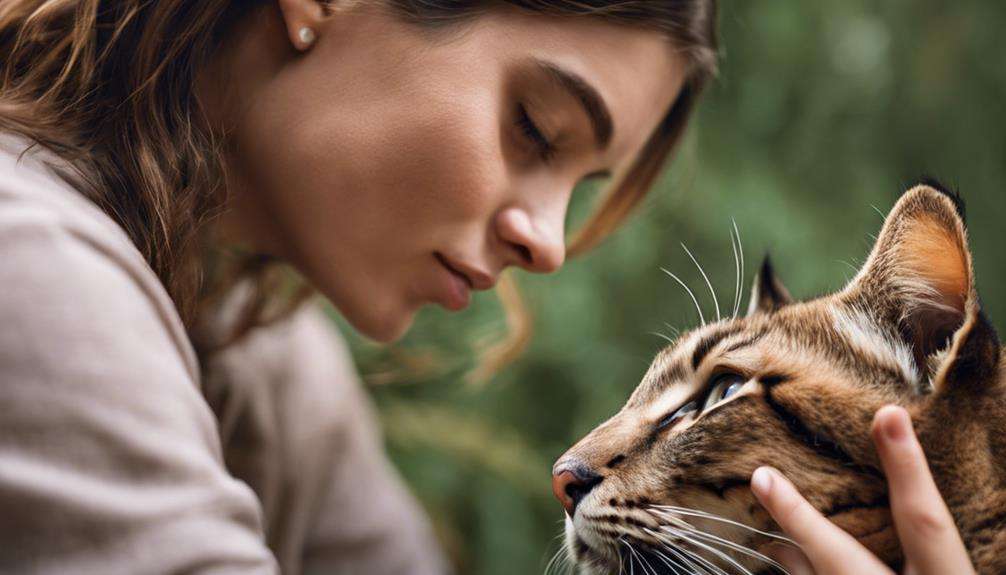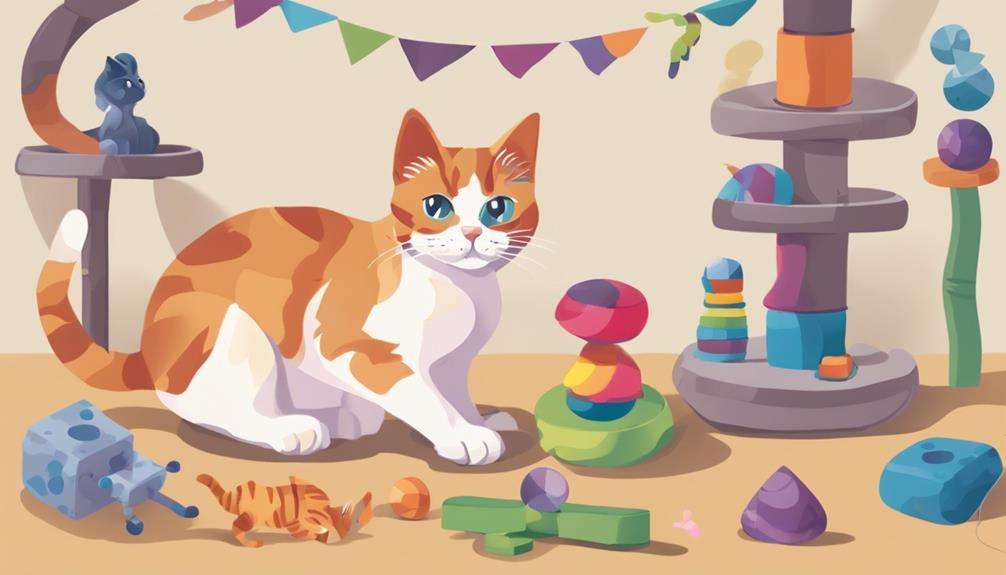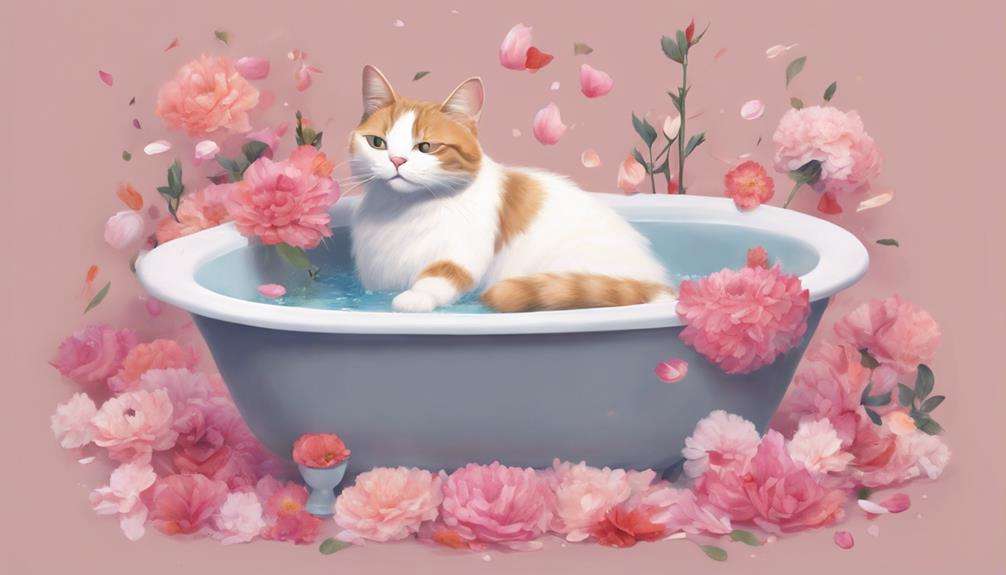If you're intrigued by the idea of unconventional feline companions, did you know that there are over 40 recognized species of wild cats that can potentially be kept as pets?
From the striking beauty of the Serval to the mysterious allure of the Ocelot, the world of exotic feline ownership offers a vast array of possibilities.
However, before you decide to welcome one of these extraordinary creatures into your home, there are crucial factors to consider that extend beyond their captivating appearance.
Stay tuned to uncover the intriguing world of unusual feline pets and the responsibilities that come with their care.
Key Takeaways
- Consider unique feline pets like Ocelots and Caracal Cats for their specific care needs and rewarding ownership experience.
- Legal requirements for exotic feline pets ownership vary by state, impacting the feasibility of keeping these unusual species.
- Unusual feline pets, such as Bobcats and Serval Cats, require specialized care, spacious enclosures, and a varied diet.
- Conservation efforts and care considerations are crucial when deciding to keep exotic feline pets to ensure their well-being and preservation.
Exotic Feline Pets Overview
Exploring the world of exotic feline pets reveals a fascinating array of small wild cat species that can captivate adventurous owners. These exotic cats, such as servals, caracal cats, and ocelots, offer a unique and captivating pet ownership experience. While the idea of having an exotic feline companion may sound thrilling, it's crucial to understand the responsibilities that come with it. Before considering bringing an exotic cat into your home, ensure that it's legal to keep such species in your area. Many states require permits and licenses for ownership to protect both the animals and the public.
These small, wild creatures have specific care needs that must be met, including proper housing, diet, and enrichment. Additionally, they require specialized veterinary care due to their unique health considerations. Finding a vet knowledgeable in the care of exotic feline pets can be challenging and expensive. Before committing to owning an exotic cat, make sure you're prepared for the financial and time commitments required to provide the best possible care for these magnificent animals.
Serval Cats
Serval cats, native to Sub-Saharan Africa, are striking in size. They can grow up to 24 inches at the shoulder and weigh between 20 to 40 pounds. Known for their agility and hunting skills, these exotic felines mainly prey on rodents in the wild.
To care for a Serval cat properly, you must provide spacious outdoor enclosures, specialized veterinary care, and a diet that meets their specific nutritional requirements.
Serval Cats' Size
Standing at 21-24 inches at the shoulder and weighing between 20-40 pounds, servals are medium-sized wild cats known for their agile nature and unique appearance. These exotic felines boast a slender build, resembling a smaller version of a cheetah, with a body length ranging from 26-29 inches.
Native to sub-Saharan Africa, servals are well-adapted to various habitats such as grasslands, savannas, and wetlands. One of the most captivating features of servals is their striking coat patterns, characterized by black spots and stripes that set them apart visually.
Their medium size, agility, and distinctive appearance make servals intriguing candidates for those seeking a unique and fascinating feline companion.
Serval Cats' Behavior
When observing the behavior of serval cats, one can appreciate their unique blend of wild instincts and adaptability to captivity.
Key Behaviors of Servals:
- Territory Marking: Servals mark their territory by spraying, making it essential to provide them with appropriate areas for this behavior.
- Tolerant of Other Pets: When raised together, servals can be tolerant of other pets, although introductions should be carefully managed.
- Dietary Needs: These exotic cats have specific dietary requirements, mainly consuming rodents. Providing a balanced diet is crucial for their health and well-being.
Servals exhibit fascinating behaviors that highlight their wild nature while also showing potential for companionship when provided with proper care and environment.
Serval Cats' Care
Marking their territory through spraying and requiring specific care, Servals are captivating exotic felines that demand attention to detail in their upkeep.
These exotic cats, native to Sub-Saharan Africa, have unique dietary needs, primarily feeding on rodents. In captivity, their lifespan can extend up to 20 years with proper care.
When housing a Serval, it's crucial to provide large outdoor caging or a dedicated room to accommodate their active nature and territorial behavior. They resemble cheetahs but are smaller in size, ranging from 20-40 pounds.
While they can coexist with other pets when raised together, they may bite if they feel threatened. Servals necessitate experienced zoo animal vet care and come with a price range of $1500-$20,000 for ownership.
Bobcats as Uncommon Pets
If you're considering a bobcat as a pet, it's crucial to understand the basics of their care.
Bobcats have specific needs that include large outdoor enclosures to mimic their natural habitat.
Legal requirements also vary by state, so researching and obtaining the necessary permits is essential.
Bobcat Care Basics
Bobcat care requires providing large outdoor enclosures with ample climbing opportunities to meet their native instincts and physical needs. When caring for a bobcat as a pet, consider the following:
- Spacious Enclosures: Ensure the outdoor space for your bobcat is large enough to mimic their natural habitat, allowing for exploration and exercise.
- Climbing Structures: Incorporate trees, platforms, and other structures to satisfy their climbing instincts and provide mental stimulation.
- Varied Diet: Offer a diet rich in meat to meet their nutritional requirements and cater to their carnivorous nature.
Legal Considerations for Bobcats
What legal considerations should you be aware of when considering a bobcat as an uncommon pet?
Bobcats are classified as exotic pets in certain states, necessitating permits and adherence to specific regulations for ownership.
Their natural habitat is in North America, and due to their strong prey drive, caring for them can be quite challenging.
Bobcats are solitary and elusive creatures, requiring large outdoor enclosures for both exercise and mental stimulation.
Legal requirements for owning a bobcat may include restrictions on their transportation and the potential risks involved in handling them.
Before deciding to keep a bobcat as a pet, it's essential to conduct thorough research and fully comprehend the legal obligations associated with their ownership.
Caracal Cats Information
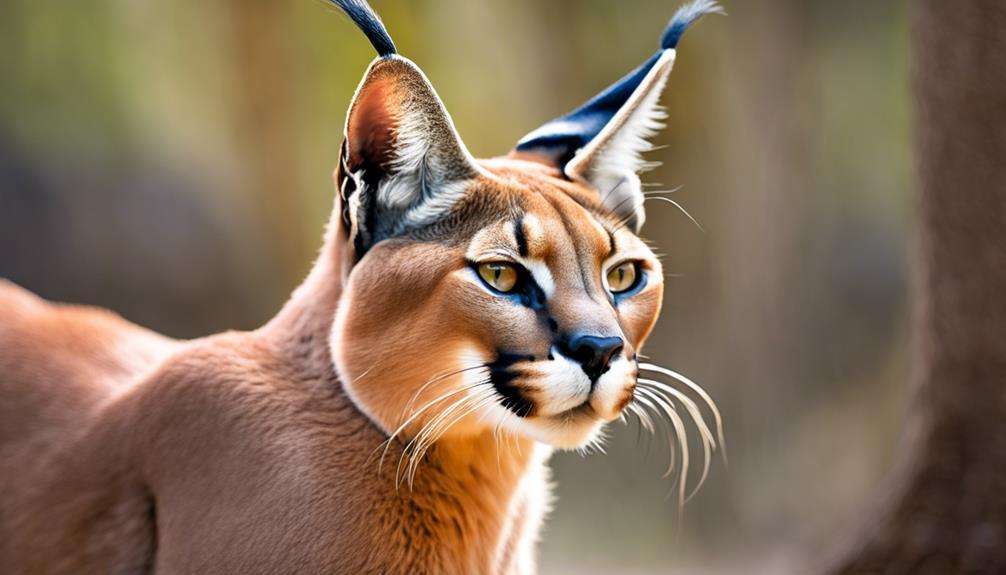
Caracal cats, native to Africa, the Middle East, and India, are intriguing exotic feline pets that require specialized care and attention. Here are some essential facts about these exotic cat species:
- Hunters: Caracal cats are excellent hunters with strong predatory instincts. Their diet mainly consists of small mammals, birds, and sometimes even larger prey like antelopes.
- Solitary Animals: Unlike some other exotic cat species, caracals are solitary animals. They prefer to live and hunt alone, needing their space and territory to thrive.
- Secure Outdoor Enclosures: Caracals need large, secure outdoor enclosures to meet their physical and mental stimulation requirements. Due to their natural instinct to roam and hunt, providing a safe outdoor space is crucial to their well-being.
Owning a caracal cat can be a rewarding experience for experienced exotic pet owners who are willing to dedicate the time and resources necessary to meet their unique needs.
Canadian and Siberian Lynxes Facts
Inhabiting diverse regions across North America and parts of Russia and Asia, Canadian and Siberian lynxes are medium-sized wild cats known for their distinctive tufted ears and thick fur coats. These solitary animals are well-adapted to their environments, using their thick fur to withstand the cold climates in which they live. Canadian lynxes are predominantly found in North America, while Siberian lynxes roam parts of Russia and Asia.
Both Canadian and Siberian lynxes have a preference for wooded areas, where they can stealthily hunt their primary prey of small mammals like rabbits and rodents. Their tufted ears not only add to their unique appearance but also aid in their exceptional hearing, helping them locate prey efficiently in their natural habitats.
If considering a Canadian or Siberian lynx as a pet, it's crucial to understand their wild nature and specific habitat requirements. These beautiful creatures require ample space to roam and exhibit their natural behaviors, making them more suitable for experienced exotic pet owners who can provide the necessary care and environment for these majestic wild cats.
Insights on Ocelots as Pets
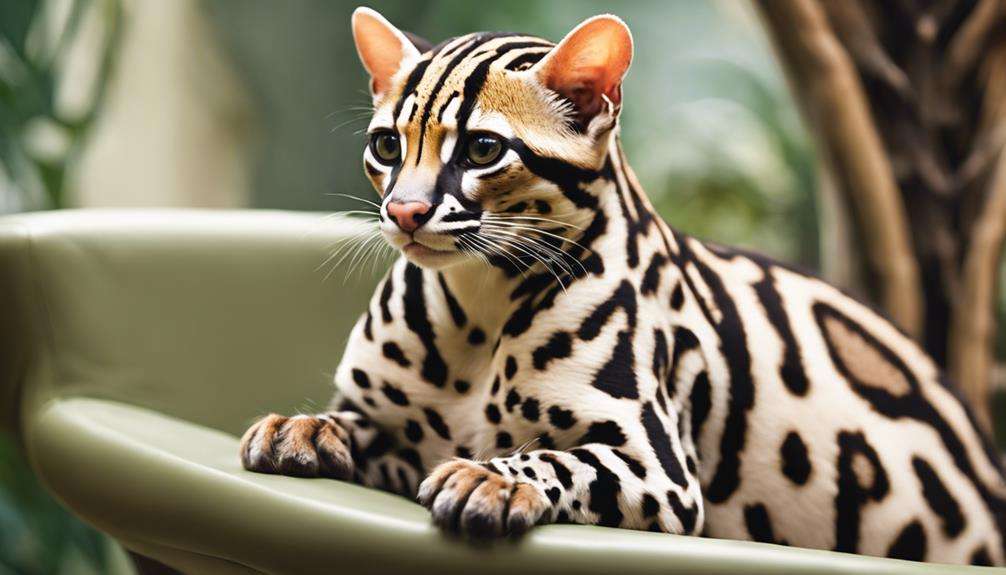
For those intrigued by the idea of owning a unique and exotic feline companion, exploring the insights on ocelots as pets unveils a world of intriguing considerations and responsibilities. Ocelots, being exotic cats native to South and Central America, boast beautiful spotted coats and sleek bodies that captivate many enthusiasts. Here are some key points to consider before deciding to bring an ocelot into your home:
- Large Outdoor Enclosures: Ocelots require spacious outdoor enclosures to mimic their natural habitat and provide ample room for exercise. Creating an environment that meets their needs is crucial for their physical and mental well-being.
- Carnivorous Diet: These magnificent creatures have a carnivorous diet, primarily consisting of raw meat. Maintaining their dietary needs can be costly and requires a commitment to providing them with high-quality nutrition.
- Solitary Nature: Ocelots are known for their solitary nature, sensitivity to stress, and need for mental stimulation in captivity. Understanding and catering to their social behaviors is essential for their happiness and overall health.
Fishing Cats as Unique Companions
Fishing cats exhibit fascinating behaviors due to their natural ability to fish, making them intriguing companions for those willing to meet their specialized care requirements.
Understanding the specific needs of fishing cats is crucial for providing them with proper care, including access to water for swimming and hunting activities.
When considering fishing cats as pets, it's essential to be prepared for the commitment involved in maintaining their well-being and ensuring their conservation.
Fishing Cat Behavior
With their remarkable aquatic abilities and distinctive coat patterns, fishing cats make for fascinating and unique companions among the feline species. Here are some interesting behaviors of these wild cats:
- Aquatic Prowess: Fishing cats are skilled swimmers with webbed feet that aid them in navigating water bodies to catch fish and other aquatic prey.
- Nocturnal Hunters: These cats are primarily active during the night, using their sharp hunting skills to capture fish, birds, rodents, and amphibians under the cover of darkness.
- Conservation Concerns: Due to habitat loss, human-wildlife conflict, and poaching, conservation efforts are essential to protect the fishing cats and ensure their survival in the wild.
Care for Fishing Cats
Exploring the unique care requirements of fishing cats as captivating companions reveals the necessity for specialized attention to mimic their natural behaviors in captivity. Fishing cats, medium-sized wild cats with webbed feet for swimming, thrive in wetland environments where they hunt fish and frogs.
As solitary animals, they prefer habitats near rivers, mangroves, and swamps. In captivity, providing large, secure outdoor enclosures with water access is vital to simulate their hunting and swimming activities.
Conservation efforts are crucial for fishing cats due to threats like habitat loss and human-wildlife conflicts. By understanding and meeting their specific needs, you can ensure the well-being of these fascinating felines while contributing to their conservation in the wild.
Discovering Geoffroy's Cats

Amidst the vast landscapes of South America, a fascinating discovery awaits those who delve into the world of exotic feline companions: the enigmatic Geoffroy's Cats. These small wild cats, native to countries like Argentina, Bolivia, and Brazil, captivate with their distinctive coat pattern featuring black spots outlined in white, reminiscent of a miniature leopard. Here are some intriguing facts about these mesmerizing creatures:
- Arboreal Lifestyle: Geoffroy's Cats are known for their agile nature and arboreal lifestyle. They're excellent climbers, showcasing their prowess in navigating trees and elevated terrains with ease.
- Hunting Instincts: Despite their small size, Geoffroy's Cats possess impressive hunting instincts. Their solitary and territorial nature reflects their prowess as skilled hunters, making them fascinating to observe in captive environments.
- Natural Habitat: Preferring habitats like dense forests, scrublands, and grasslands, Geoffroy's Cats thrive in environments that offer hiding spots and opportunities for them to exhibit their natural behaviors.
Exploring the world of Geoffroy's Cats unveils a realm of wonder and intrigue, making them a captivating option for those seeking unique feline companions.
Jungle Cats as Exotic Options
Geoffroy's Cats offer a peek into the captivating world of exotic feline companions, and delving further into this realm, one encounters Jungle Cats as intriguing options for experienced owners. Native to Asia and the Middle East, Jungle Cats are considered exotic felines that thrive in large, secure outdoor enclosures.
While legal in some states with permits, these majestic creatures require experienced owners who can cater to their solitary and territorial nature. Providing ample hiding spots and maintaining high humidity levels are crucial for the well-being of Jungle Cats in captivity. One fascinating aspect of Jungle Cats is their arboreal lifestyle, showcasing exceptional climbing skills that need to be accommodated in their living environment.
Understanding the complexities of caring for these exotic felines is essential for those considering Jungle Cats as unique and challenging companions.
Asian Leopard Cats Consideration
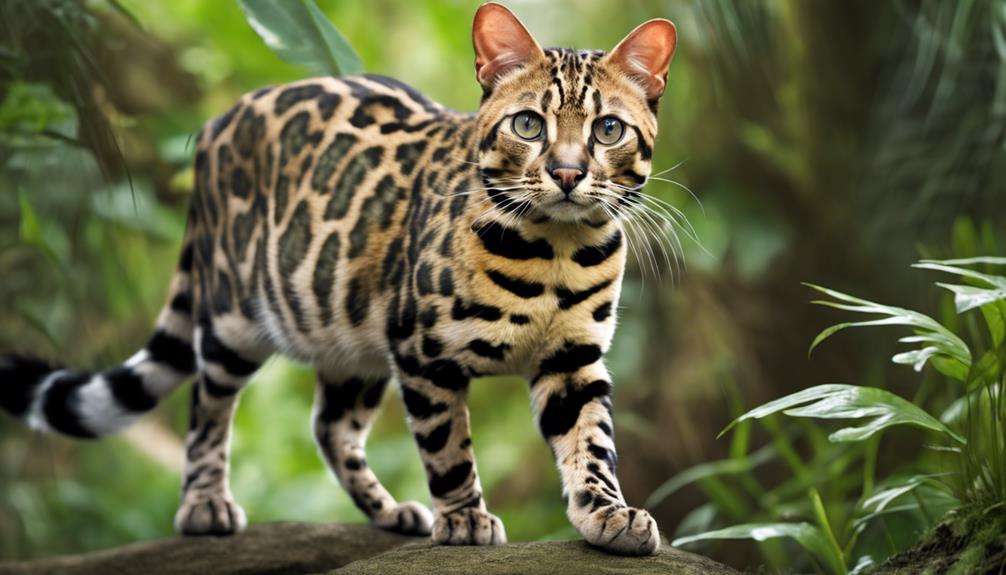
Consider the unique care requirements and behavioral traits of Asian Leopard Cats when contemplating them as potential exotic feline companions. Asian Leopard Cats, though they share similarities with domestic cats, have specific needs due to their wild ancestry.
Here are some key aspects to consider:
- Shy Behavior: Asian Leopard Cats are known for being shy around humans. Patience and a calm environment are essential to help them feel comfortable and secure in their new home.
- Territorial Instincts: These cats are territorial by nature. Providing designated spaces for them to retreat and feel safe is crucial to prevent stress-related behaviors.
- Prey Drive and Mental Stimulation: Due to their strong prey drive, Asian Leopard Cats benefit from interactive toys and activities that mimic hunting. Mental stimulation is vital to keep them engaged and prevent boredom.
Understanding and accommodating these traits are essential for a successful and fulfilling relationship with an Asian Leopard Cat.
Frequently Asked Questions
What Is the Most Unusual Cat?
The Lykoi cat is the most unusual, with its werewolf-like appearance due to a genetic mutation. They're exotic breeds sought after for their unique personalities and rare traits. Opt for unconventional companions and consider wild hybrids.
What Are Some Interesting Pet Cats?
When looking for interesting pet cats, consider exotic breeds, hybrid cats, unique markings, domestic wildcats, and rare colors. These felines offer a touch of the extraordinary in your home, bringing a new level of fascination.
What Is the Rare Cat to Own?
For a rare cat to own, consider exotic breeds like the Khao Manee. With unique markings, uncommon hybrids, rare colorations, and distinct personalities, they make fascinating companions. Their stunning white coat and jewel-toned eyes are truly captivating.
What Is the Coolest Cat to Own?
If you're looking for the coolest cat to own, consider exotic breeds like the Savannah cat. They are hybrid wildcats with unique markings, playful personalities, and can be hypoallergenic. These feline companions offer a striking appearance and loyal companionship.
Conclusion
In conclusion, when considering unusual feline pets, explore exotic options like Servals, Bobcats, Caracal Cats, Canadian and Siberian Lynxes, Ocelots, and more. These majestic creatures require specialized care, including unique dietary needs and large outdoor caging.
Before bringing these captivating companions into your home, research ownership regulations, costs, and specific care requirements. Embrace the excitement of owning an exotic feline friend, but remember to prioritize proper preparation and care for a purr-fectly rewarding experience.

